Hey y’all, Barbarella here. Simon Barrett is known for writing great horror like YOU’RE NEXT, which re-invigorated tired Fantastic Fest audiences at its midnight premiere in 2011. Almost a decade later, the writer has shifted into the director’s seat to helm his latest work, SEANCE, starring Suki Waterhouse and Inanna Sarkis. The horror film merges mean girls and supernatural elements for an entertaining mystery at a boarding school. I had the opportunity to speak with Simon Barrett via telephone. Check it out!
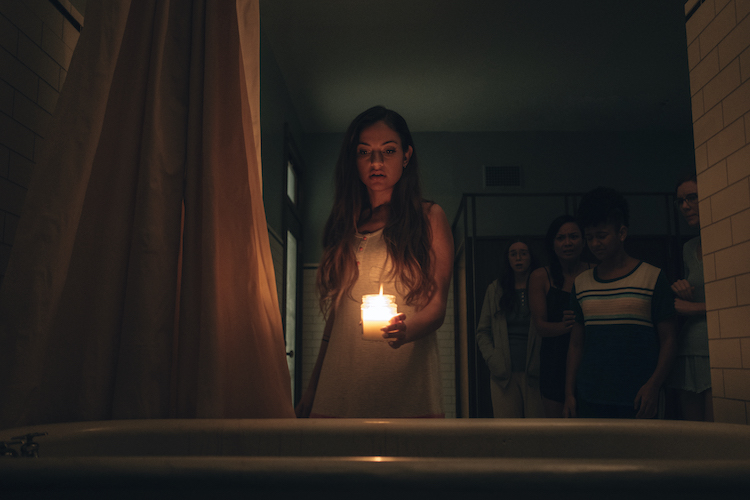
Hey, I'm a huge fan of Korean thrillers, and I heard that you are doing a remake of I SAW THE DEVIL. Is that true?
“I'm not sure that's true anymore, to be honest with you. We were developing that for a long time. With Kim Jee-woon's blessing, I wrote a script that was fairly different from the original, at least in its last third. Ultimately, it was a fairly expensive project, and there were certain things that we knew we couldn't compromise on. For example, I will tell you that at one point, Adam Wingard’s studio was interested in doing it if we could do it at a PG-13 level, and we were just like, “Have you seen the original film?” And they were like, “No.” That was pretty much the end of that meeting because we knew that if we compromised on something like that, literally every fan of the original would hate us, and we wouldn't make any new fans either.
“The original I SAW THE DEVIL was a fairly big-budget production. I mean, it starred basically the two largest stars in Korea at the time, Lee Byung-hun and Choi Min-sik from OLD BOY. You don't want to do an American version that doesn't deliver. If you're going to do an I SAW THE DEVIL here, you almost want it to be Tom Cruise as the serial killer versus Will Smith as the vengeful secret agent.
“We were trying to do it, I think, as a fairly small film, and ultimately, I'm just not sure that's anything that anyone would've wanted. Now at this point in his career, maybe that's something, if Adam really wanted to, he could pound his fist on a table and get it made. I think we both kind of agree that my script was really good. We're really happy with it, but maybe at the end of the day, we don't want to be the guys that forced everyone to explain which version of I SAW THE DEVIL they prefer when they say it's one of their favorite films. And I think coming off of DEATH NOTE, Adam was a little cautious. I really liked what he did with DEATH NOTE, and I think his version of it actually had a lot to say that people didn't fully appreciate. I will also say that I saw an earlier cut of it that I thought was maybe a little more clear.
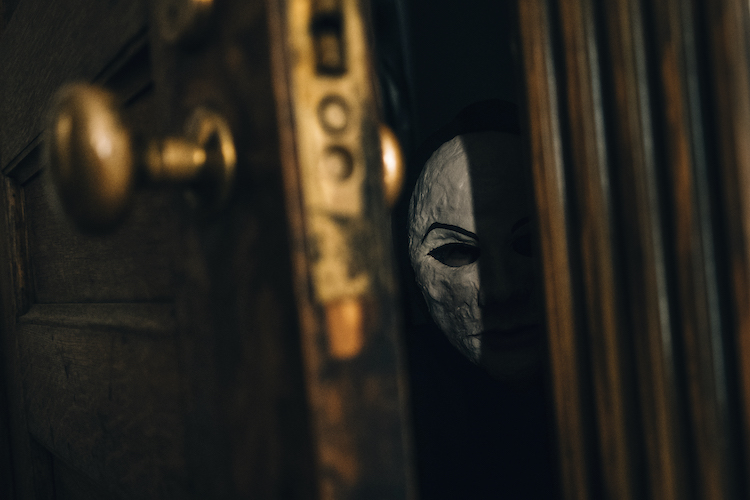
“I SAW THE DEVIL was not a success in any country. When we were initially pursuing the rights, people in Korea seemed vaguely embarrassed that that was our obsession. It was kind of like if an amazing Korean filmmaker came here, but the only movie they wanted to talk about was WEDDING CRASHERS. And you're saying, "No, we have other cinema." Everyone in Korea was talking to Adam, and they're like, "No, no, no. You should see WAR OF THE ARROWS. It is a really good one.” [And we’re like], “Yeah, that’s good too, but we want to do I SAW THE DEVIL, the flop.”
“So ultimately, at the end of the day, it's a very dark film, and there's not a huge audience for it. We did our best, I think, to develop it and get it to a good place, but we had a vision for it that wasn't much more commercial than the original, and maybe it's best that we moved on to other things.”
Yeah. Well, I think it's a great movie.
“I mean, it's an expensive movie. I believe the original I SAW THE DEVIL shot for 195 days. The way they make movies in Korea is very different from the way they make movies here, so it's like, "Well, how do you replicate that?" It just felt like a certain point where we were setting ourselves up for failure, especially after BLAIR WITCH and DEATH NOTE got kind of mixed reactions. I think it kind of felt like we needed to start getting back to telling original stories.”
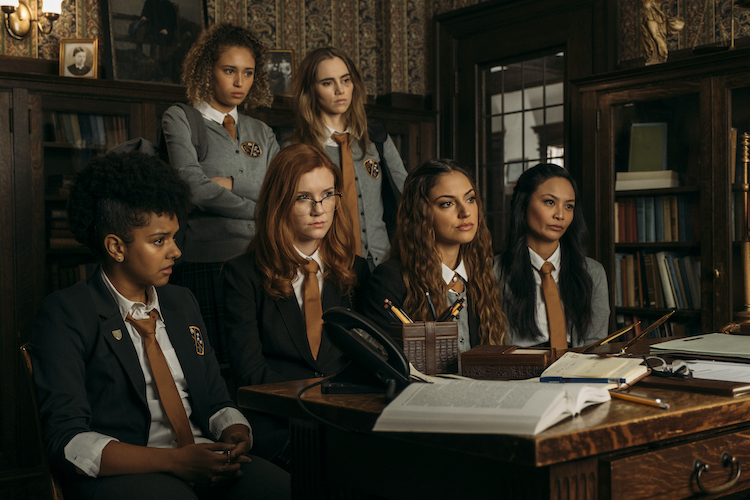
Speaking of original stories, SEANCE kind of combined several horror sub-genres. Did you start out thinking, "Boarding School," or "Ghost story," or "Urban Legend?" How did it evolve and grow into what it became?
“I think the germ of the story was just this notion of I love old hard-boiled, private investigator mysteries, and I think one of the things that I enjoy the most about them is you put a tough character in a preexisting dynamic and kind of watch the story unfold from there. The character played by Suki Waterhouse, the Camille Meadows character, that was really my starting point. I wanted to do another YOU’RE NEXT, THE GUEST kind of story, but a more optimistic version where you have a mysterious stranger show up at a place, which is how most boarding school horror films start, including... Obviously, the film's structurally fairly similar to SUSPIRIA.
“I think that was just pretty much kind of in my head as what I wanted the starting point to be for the story, and it kind of unfolded from there, but I mean, I really just consumed so many murder mysteries and Giallo-slashers, that I kind of knew that was a story that I wanted to try telling at some point, and if I did, I wanted to go the classical route.”
![[L-R] Ella-Rae Smith as Helina and Suki Waterhouse as Camille in the horror SEANCE, an RLJE Films and Shudder release. Photo courtesy of RLJE Films and Shudder. [L-R] Ella-Rae Smith as Helina and Suki Waterhouse as Camille in the horror SEANCE, an RLJE Films and Shudder release. Photo courtesy of RLJE Films and Shudder.](https://media.aintitcool.com/media/uploads/alternate2021images/barbarella/seance_pr_still_7.jpg)
What is your writing process? Do you sequester yourself and write until you're done or do you kind of write when you're inspired? Do you listen to music when you write?
“It's all over the place. It's kind of what I require in the moment. Usually, I do not have the luxury to sequester myself because I'm usually working on other projects, and I haven't had a great deal of success yet, so I can't go off and rent a hotel room somewhere and crank a script out in a week because I have other responsibilities.
“I kind of write when I can, which is increasingly just in the odd hours, and I tend to write very neurotically. I think the only thing about my process that's imitable or advisable is I tend to write my endings first because I think endings are the most important part of a film. How something wraps up is what matters most to me as a viewer, usually, and so I tend to write those scenes first and then kind of work towards them, and that's probably the only thing about my writing process that is not just like revealing of my own personal neuroses, because I am a very neurotic and anxious writer. And this day, I pretty much procrastinate beyond the last minute on everything. Every single time, I tell myself it's going to be different, and every single time it just gets worse.”
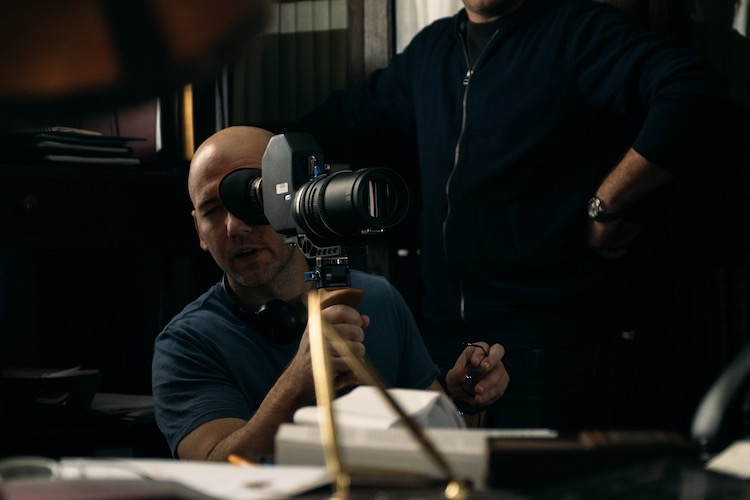
I think that's common for a lot of great writers, to be honest.
“Yeah, but I also think the thing is if you're on Twitter, you see all these people all day being like, "Get out there and write. Put in your twenty pages. Every day I get up at 9:00 AM, and I do five-thousand pushups, and then I write for eight hours, and I have my coffee, and I make love to my wife and kiss my beautiful children." And I'm sitting there just like, "Fuck you. This is so unrelatable. I hate this so much. This is not actionable advice for anyone because everyone's lives suck, and we're all miserable, especially if you're a writer, you're miserable.” We need to acknowledge that this is a process that is incredibly weird, and again, I just keep using the word neurotic because I don't know how else to describe the weird, idiosyncratic things that I do to my brain before I can write. And often, yeah, I think that's finding a perfect piece of music, and often it's just procrastinating until I’m so far past the point of anxiety and exhaustion that I have no choice but to create something.”
Yeah. Are you hard on yourself?
“I believe that being a great artist requires a unique combination of a hundred-percent confidence with zero-percent self-satisfaction. Whether that leads to life happiness or not remains to be discovered, but I don't know any other way to exist. I think in the moment, you have to believe completely in what you're doing, so you can make those instinctive directorial choices that lead to great art and cinema. And I say this with proper humility knowing that I'm talking about SEANCE, which is essentially a low-budget slasher movie, but you know what I mean.
"You always essentially should be aspiring to greatness because otherwise there's no point to doing anything. I think you always have to have the sense that what you're doing could be the greatest thing ever. But then, I think as soon as you're done with it, it's totally reasonable to say, "Oh well, I screwed that up completely. Well, the next one will be great.” You have to be completely confident so that your cast can trust you and your crew can trust you, and ideally, you have to be pretty good at what you're doing in turning those things, as well, but I think patting yourself on the back and being like, "Yeah, I did it. Congratulations; I'm a great director" after you have a success, is the worst thing you can do.
![[L-R] Jade Michael as Lenora, Stephanie Sy as Yvonne, and Suki Waterhouse as Camille in the horror SEANCE, an RLJE Films and Shudder release. Photo courtesy of RLJE Films and Shudder. [L-R] Jade Michael as Lenora, Stephanie Sy as Yvonne, and Suki Waterhouse as Camille in the horror SEANCE, an RLJE Films and Shudder release. Photo courtesy of RLJE Films and Shudder.](https://media.aintitcool.com/media/uploads/alternate2021images/barbarella/seance_pr_still_5.jpg)
“Now, I haven't had any success in my career, so I can't necessarily know what I would do if given that choice. But I will say that I have seen my friend Adam Wingard experience some success recently, during that period of GODZILLA VERUS KONG making all the money in the world and bringing back the theatrical box office. He just worked the entire time, because ultimately, that's it. The work is the reward. If you're doing it for the right reasons, all you're earning is the ability to keep making movies, ideally, with better people and increasing creative freedom. The work is the reward, and the work is the finish line.
“And I think anyone who doesn't approach it with that attitude is working for the wrong reasons. And so I probably meet every functional definition of a workaholic. I'm not a very functional person if I'm not working, but it doesn't matter, because I'm working all the time, and that's just how I exist. I don't really know any other way to be. Maybe that comes from growing up poor or whatever. Maybe it's just my personality, whether it's capitalism or me is unclear; I guess I'll never know. I do think that one of the worst things you can do is feel like you've achieved something or that you've grown past a certain point because then you are limiting yourself creatively.
“And I think the filmmakers that I admire are the filmmakers that are just always trying to improve, and trying to be original, and never repeat themselves: the Coen brothers, Claire Denis, people like that where it's like, "Wow. This person's just on a different wavelength." That's where I want to be. I never want to say, "Oh, this is great." I want to say, "What could I have done better? What will I do better next time? What lessons have I learned from this?" And then of course, you go onto your next project, and it's completely different, and you can't apply any of that, and you make a whole new set of mistakes, and the process continues. And that really is, I think, if you have an open heart, the correct way to work. I don't know any other way to be. Yeah. Maybe I need to figure it out, but for now, I think it's the right approach.”
![[L-R] Stephanie Sy as Yvonne, Inanna Sarkis as Alice, Madisen Beaty as Bethany, Djouliet Amara as Rosalind, Suki Waterhouse as Camille, and Ella-Rae Smith as Helina in the horror SEANCE, an RLJE Films and Shudder release. Photo courtesy of RLJE Films and Shudder. [L-R] Stephanie Sy as Yvonne, Inanna Sarkis as Alice, Madisen Beaty as Bethany, Djouliet Amara as Rosalind, Suki Waterhouse as Camille, and Ella-Rae Smith as Helina in the horror SEANCE, an RLJE Films and Shudder release. Photo courtesy of RLJE Films and Shudder.](https://media.aintitcool.com/media/uploads/alternate2021images/barbarella/seance_pr_still_6-2.jpg)
I would argue that you're saying you're not a success, but I think you've written great movies, so you are a success in my eyes. I mean, maybe not financially….
“Thank you. I certainly don't want to diminish my work, which I'm really proud of. I'm very lucky to have come from where I came from and be doing what I do to make a living. Not many people do that. And obviously, I've experienced a tremendous amount of privilege that's gotten me here. I will never disrespect anyone who spends their money and time on my films. I want to reward what they expected from the movie. I want them to feel like they got their money and time's worth. I don't just want to surprise them; I want to deliver on their expectations and then surprise them. Because I'm so lucky to be where I am, I need to make sure that I'm always expressing that gratitude through my effort.”
I'm going to ask one more question because I think we're about out of time, but filmmaking always has a lot of unsung heroes. Who’s somebody in SEANCE’S crew who wouldn't normally get any kind of real recognition, but who really made a difference in the film, and what did they do?
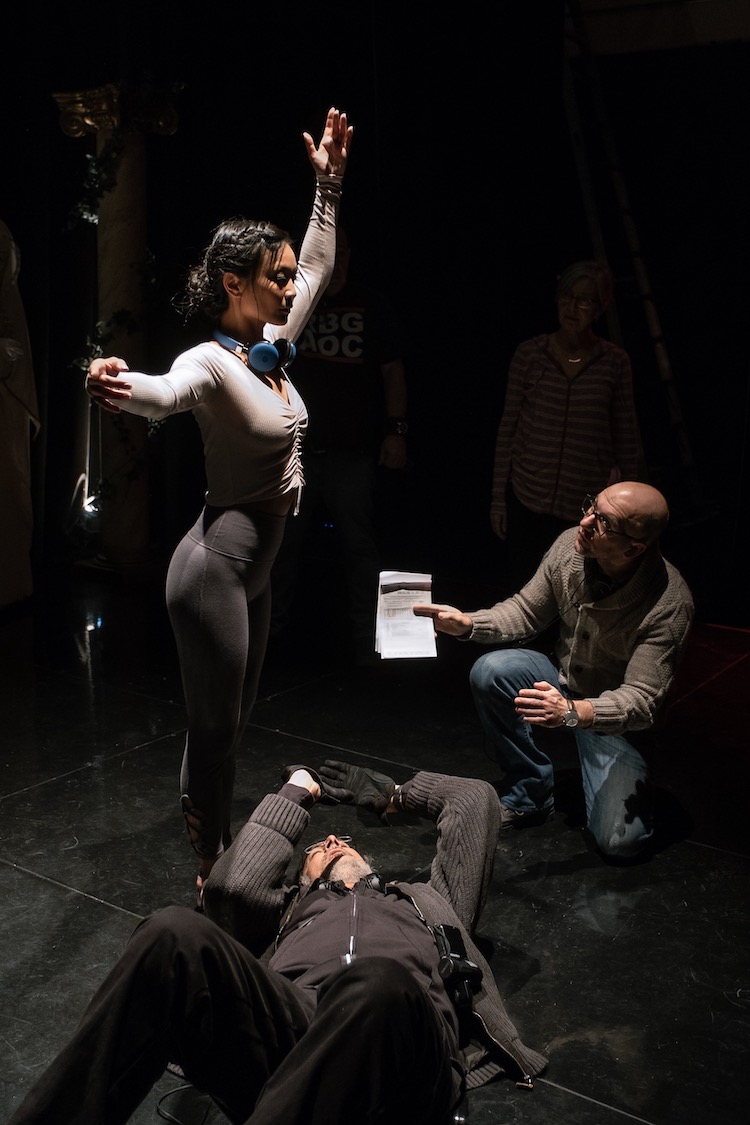
“Wow. What an amazing question. I almost wish I'd had time to think about it, but if you gave me too much time to think about it, I'd end up in a situation where I wanted to name too many people. Our key grip, Reil Munro. He'd kind of come up from grip, and I was so obsessive about our camera movements, and his department was so able to deal with me. I would literally walk up to his grip team and be like, "I need that movement to be twenty-seven percent faster." And I'd hear them as I walked away, they're like [mockingly], "Twenty-seven percent" because they knew I was saying an insane thing, but then they would do it. That was the thing; I would tell them to do that, and then they would precisely do it. I never had to worry about them setting stuff up. Reil was just the best key grip I've ever worked with, and having a good grip team [is essential] when you're a director making a movie like SEANCE where there's a lot. You're just constantly running from set up to set up to set up to set up. If I hadn't had someone great in that position, I wouldn't have made the movie. We couldn't have made our days. I think he's an indigenous dude in Winnipeg, and he's kind of up and coming. I feel like he's going to be a really big deal in the Winnipeg film scene wherever he lands because his team was just so cool and fast and good at what it did.
Simon Barrett’s SEANCE, which has a little bit of almost everything, is available now in Theaters and On Demand and Digital.
